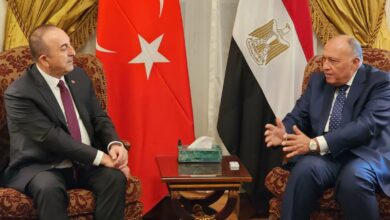MIsrata — Tripoli came under air attack early Thursday as Libyan rebels celebrated the captured the strategic Misrata airport after a fierce battle with Muammar Qadhafi's troops, their first significant advance in weeks.
The airport of Libya's third-largest city fell to the rebels after long and intense fighting, an AFP correspondent said. Misrata had been under siege by loyalist forces for almost two months.
By Wednesday afternoon, insurgent fighters were in full control, as people celebrated the victory in the streets and others set ablaze tanks left behind by Qadhafi troops.
The airport's capture is significant, as the rebel-held city had been nearly cut off from the outside world. Its port, which has been repeatedly shelled, has been the only route in or out.
Human rights groups have warned of a looming humanitarian catastrophe in the city of 500,000 people, which faces acute shortages of food and medical supplies.
Insurgent forces captured 40 Grad rockets from the regime troops, whose mortar fire wounded 13 rebels, the AFP correspondent said.
A spokesman for the rebel National Transitional Council (NTC) in Benghazi, Abdel Busin, confirmed that Misrata airport had been captured and pushed back Qadhafi forces around 15km (nine miles).
The AFP correspondent said the airport had been "completely destroyed" and that fires were burning around it.
Salah Badi, who commanded the assault on the airport, said Qadhafi officers had retreated and forced soldiers to stay. Some tried to carry on the fight, but most tried to leave in civilian clothes.
He said rebel positions were now only 10km (six miles) away from Zliten to the west and that, after resting, they will attempt to continue their advance.
In Tripoli, four explosions in quick succession rocked the capital city early Thursday as jets were heard flying overhead.
The blasts, which came from the direction of the Bab al-Aziziya area where Qadhafi's compound is located, shook the windows of a hotel where journalists are staying in the capital.
Two plumes of white smoke could be seen rising above the city following the blasts, as emergency vehicle sirens wailed and sporadic gunfire rang out.
The strikes came just a few hours after Libyan state TV late Wednesday showed footage it said was of Qadhafi meeting with tribal leaders, the first new video of him aired since an 30 April air strike that the regime termed an attempt on his life.
The regime said that strike killed his son Saif al-Arab and three of his grandchildren, in "a direct operation to assassinate the leader of this country."
State TV said the footage was of a meeting between Kadhafi and tribal dignitaries from the east of Libya, an area held by rebels seeking his ouster.
A Libyan official told AFP the video was shot around 7:30 pm (1730 GMT) Wednesday.
An international coalition began carrying out strikes on forces loyal to Kadhafi on March 19. NATO took command of operations over Libya on 31 March.
Meanwhile Britain said that the head of Libya's rebel council will visit the country Thursday and meet Prime Minister David Cameron to discuss the possibility of setting up a London office.
Libyan National Transitional Council (NTC) chairman Mustafa Abdul Jalil will also meet Foreign Secretary William Hague and finance minister George Osborne to examine measures agreed at last week's Contact Group meeting in Rome, the Foreign Office said in a statement.
It will be the first time that Jalil has met the British leader for face-to-face talks.
In Washington, officials said the first shipment on non-lethal US aid to Libyan rebels arrived in the rebel-held eastern city of Benghazi.
State Department spokesman Mark Toner said the aid, which arrived Tuesday, "consisted of more than 10,000 halal meals ready to eat, so-called MREs," from US Defense Department stocks.
"Other items are en route and include medical supplies, uniforms, boots, tents, and personal protective gear," also from US reserves, Toner said.
Separately, senior US Senator John Kerry said he was drafting legislation to tap some of Qadhafi's frozen assets to provide humanitarian aid to the rebels.
"What they're looking for is, very simply, humanitarian assistance, technical assistance, the assistance that they believe they will need after the Kadhafi regime falls," said Kerry.
Inspired by the uprisings in other Arab nations, rebels have been fighting since mid-February to oust Qadhafi. They have met stiff resistance despite taking a large chunk of eastern Libya and establishing a stronghold in its main city of Benghazi.
In other combat, loyalists killed at least two rebels and wounded 15 near the rebel-held town of Zintan in the western mountains, an AFP correspondent said.
Rebel fighters came under attack from snipers when they entered Rya Ina village, about 15km (nine miles) east of Zintan, the correspondent said.
UN chief Ban Ki-moon urged Libyan Prime Minister Baghdadi Mahmudi to immediately stop attacks on civilians and called for an "end of fighting in Misrata and elsewhere."
And Poland's Radoslaw Sikorski became the first EU foreign minister to travel to rebel-held eastern Libya. In Benghazi, he expressed support for the uprising, but stopped short of recognising the rebel administration.
"We believe that the best thing that Colonel Qadhafi can do is relinquish the reins of power," he said at a joint press conference with the administration's vice chairman Abdul Hafiz Ghoga.




